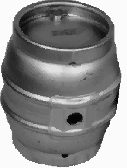 |
Brewtopia Events LLC www.ClassicCityBrew.com Cask Ale Clarifications By Owen Ogletree Owen is the founder and organizer of the annual ATLANTA CASK ALE TASTING. This article appeared originally in Southern Brew News. |
 |
Brewtopia Events LLC www.ClassicCityBrew.com Cask Ale Clarifications By Owen Ogletree Owen is the founder and organizer of the annual ATLANTA CASK ALE TASTING. This article appeared originally in Southern Brew News. |
|
|
||
| Cask-Conditioned Ale Tips:
With
cask-conditioned ales making regular appearances at a growing number of pubs,
brewery tours and festivals from Alabama to North Carolina, this interesting
process and tradition now forms the hottest new beer trend in the Southeast. Unfortunately,
many people responsible for brewing, distributing and serving cask ales
sometimes lack the knowledge needed to provide the very best pint to the
customer. Cask-conditioning
comes from the English tradition of placing young, unfiltered beer with yeast,
a touch of residual sugar and clarifying finings into sealed metal or wooden
casks. Typical casks hold 10.8 gallons of beer and are known as “firkins.”
Inside the bunged firkin, yeast consumes remaining sugars, producing soft carbonation
and subtle, appealing fermentation notes before settling into the belly of the
cask as sediment. English
pub owners - well versed in the care and serving of cask ales - place their
firkins in horizontal "stillage" position in the pub's cool cellar
immediately upon delivery. From this point, the casks remain still - never
moved or jostled until empty. After a few days of allowing the beer to clarify
and form a sediment, the publican hammers a porous, wooden peg (spile) into the
cask’s top bung to vent any excess carbonation. A tap is later hammered through
another bung on the front of the cask, with the ale being served by hand pump.
BORN
IN THE U.S.A.
Cask
ale must include a secondary fermentation with live yeast cells and a
conditioning period inside the cask, so putting filtered, carbonated beer into
a cask doesn't constitute cask ale. All cask ales should have sediment. Watch
carefully at a pub's cask ale tapping - if a cask is rolled out or carried in a
vertical position, then put in horizontal stillage position, immediately tapped
and pours clear, it is probably not real cask ale. If cask ale were handled in
this manner, it would pour very cloudy and murky. A slight haze is considered
acceptable in U.S. cask versions, but murky, muddy or chunky cask beer should
be avoided. Murky
cask ale is no fun. This is an indication that the beer might contain too much
residual sugar, still be fermenting actively and hasn't been given time for
yeast to settle and the beer to clarify. It's also possible that the cask was
up-righted or agitated before serving. Infection from bacteria and/or wild
yeasts could also the issue, but taste and aroma will usually give this away.
Oskar Blues' Tim Matthews preps a cask in the brewery tasting room. PATIENCE
IS THE KEY
Cask
ales should never be up-righted or jostled prior to serving and should never be
delivered and served on the same day. A cask should have at least two to seven
days in very cool, horizontal stillage position at the pub before being served.
If late delivery of a cask occurs on the scheduled day of tapping, pub owners
should immediately place the cask in cool stillage position and postpone
tapping for at least a couple of days (one week would be better) - definitely a
preferable alternative to murky beer. Pub
owners shouldn't try to soft spile and vent a firkin rapidly just a few minutes
prior to serving. Vigorous soft spiling often causes drastic pressure
fluctuations that dredge up sediment and make the beer cloudy. Several hours
might be needed to allow the yeast to re-settle. Denser,
but still slightly porous wooden hard spiles typically vent pressure above 3-5
PSI or so - just right for a cask. But these hard spiles sometimes take 1-2
days to vent the cask slowly down to desired levels of carbonation pressure. If
a day or two exists before tapping a cask, busy pub owners may just use a hard
spile to vent - 90% of the time, this works.
Also remember that any spile blocked by a hop bag placed in the cask
will vent much slower or stop all together. Owen Ogletree at his Atlanta Cask Ale Tasting. A
COOL SPARKLE
Casks
taste best when served no warmer than 50-55 degrees F. Cask ales should offer a
soft, subdued, bright carbon dioxide sparkle and should never be flat - with occasional
exceptions involving well-aged, port-like, high-gravity old ales or
barleywines. Beer festivals provide even more difficult challenges for organizers wishing to include cask ales. Where should casks be stored and vented in cool stillage position for several days before the event? What's the best way to transfer casks gently and carefully to serving positions on fest day? Pouring staff must be trained regarding the nuances of cask ale tapping and serving. How will the casks be kept cool during serving? Cask ales require planning, preparation and practice. ******
Owen
Ogletree loves cask ale, makes regular visits to England's best cask ale
breweries and pubs, and runs the annual Atlanta Cask Ale Tasting. |